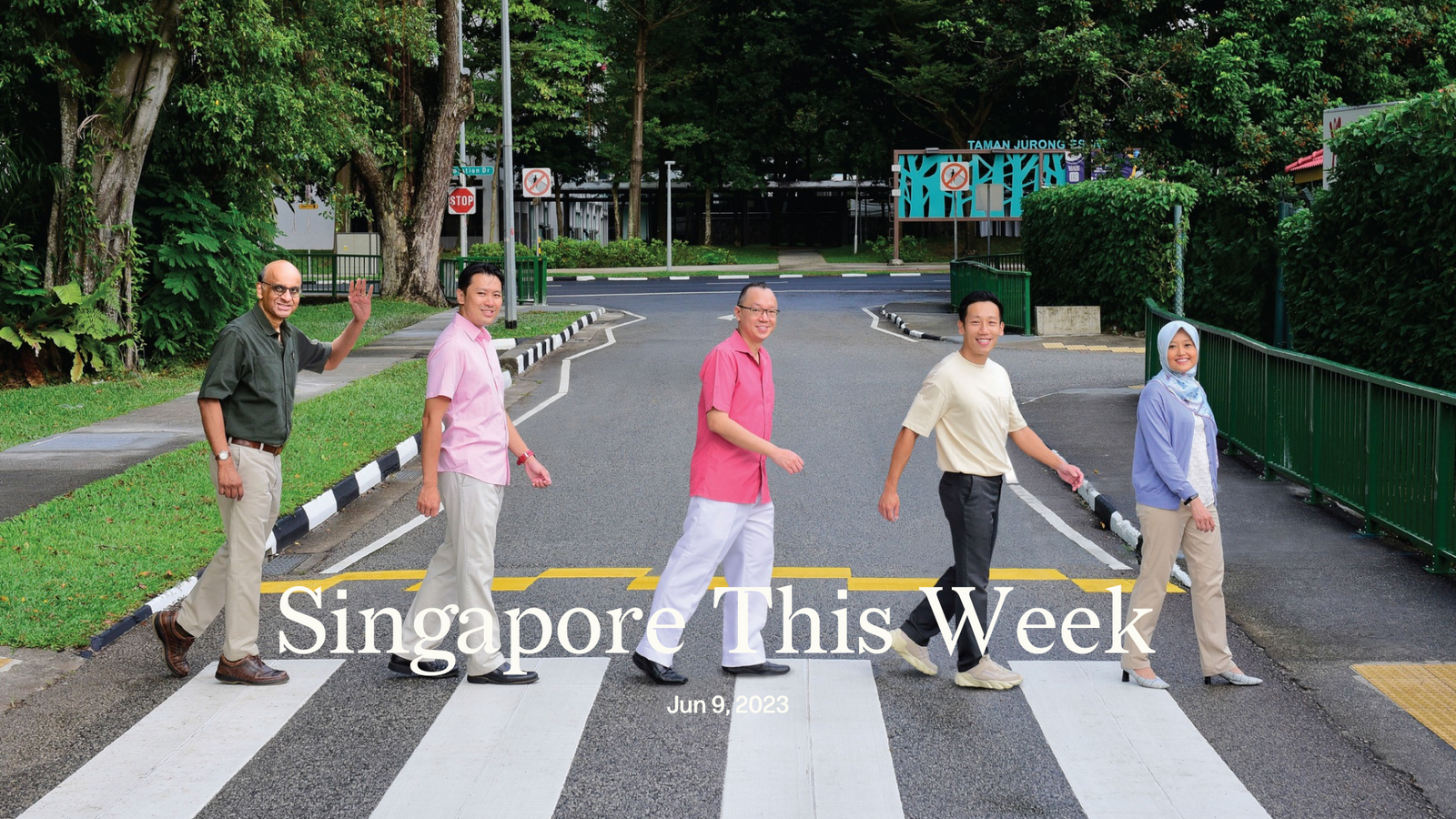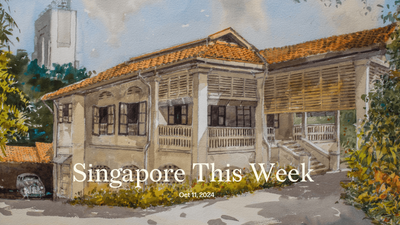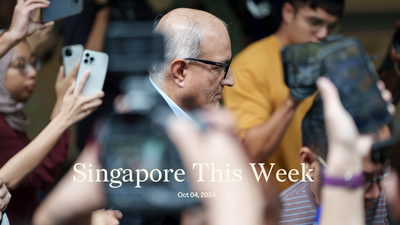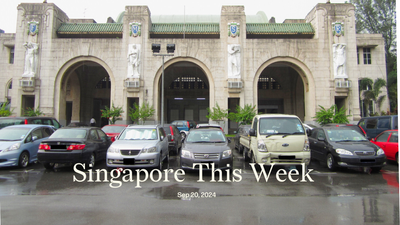Politics: Another presidential election walkover?
As rumoured last week, Tharman Shanmugaratnam, senior minister, will be standing in the presidential election this year (it must be called by September 13th). Yesterday, he announced his intention to retire from politics, government as well as from the ruling People’s Action Party (PAP). Tharman is immensely popular across the political spectrum, so it’s a safe bet that he will not only become president, but might do so in a walkover. Anybody who runs against him will likely be doing so just to offer Singaporeans a democratic contest—something denied in 2017, after the government ruled that Halimah Yacob, the incumbent, was the only qualified candidate. There are risks for the PAP in anointing Tharman as its candidate. First, even though the role is largely ceremonial, the presidency has some key powers, such as safeguarding Singapore’s reserves and the ability to veto important public service appointments. Tharman will be “thorough and impartial” in fulfilling these duties, he said, in a farewell post. He also said he will represent Singaporeans of all “political persuasions at a time when views in the population are becoming more diverse” and that his “role vis-à-vis the Government will change fundamentally.” There is a small possibility, then, that Tharman will annoy his former party as Ong Teng Cheong, president from 1993 to 1999, once did. Second, the PAP will now have to find another political heavyweight to replace Tharman in the electoral contest for the Jurong Group Representation Constituency (the next general election is due by 2025). Tharman’s four teammates are nowhere near as popular as he is, and the party risks losing in Jurong if it faces a strong opposition team. But why does Tharman want the presidency? His commitment to public service aside, one source told Jom that Kanagaratnam Shanmugaratnam, Tharman’s late father and renowned pathologist, was once asked by the party to serve as Singapore’s second president. He declined, and the role was instead filled by Benjamin Sheares (from 1971 to 1981). Now, at the second time of asking, the Shanmugaratnams have said ‘yes’.
Politics: Opposition ‘alliance’ unlikely to worry incumbents
The Workers’ Party (WP), the Progress Singapore Party (PSP) and the Singapore Democratic Party (SDP) may be the only brand name opposition parties in town, but there are actually over 10 in operation. Four tiny ones—the Peoples Voice, the Reform Party, the People’s Power Party and the Democratic Progressive Party—have just agreed to form the People’s Alliance ahead of the next general elections. This will allow them to pool resources and theoretically afford them greater visibility. “The People’s Alliance seems like a brand new opposition party,” wrote Elvin Ong, assistant professor of political science at the National University of Singapore and author of Opposing Power: Building Opposition Alliances In Electoral Autocracies. Ong says a true opposition alliance is possible only if it includes the WP and PSP (the only two opposition outfits with seats in Parliament); it avoids three-cornered fights; and it has a common manifesto and campaigns jointly. The People’s Alliance will need a party as a vehicle—not just an alliance—if it intends to contest in a group representation constituency, as electoral rules require these multi-candidate teams to all be from the same party. The Reform Party’s Kenneth Jeyaretnam and the Peoples Voice’s Lim Tean are the most prominent politicians in the group. “KJ”, son of former parliamentarian JB Jeyaretnam, is known for his attempts to doggedly unearth supposed financial improprieties among the governing elite—a recent post sparked the ongoing RidoutGate saga. Lim’s nativist rhetoric, under the banner of job protection for local professionals, has almost certainly worsened discrimination against ethnic Indians (local and foreign). “See how ordinary Singaporeans Hate CECA!” screamed one post, referencing the India-Singapore Comprehensive Economic Cooperation Agreement (signed in 2005). Though Singapore’s failure to moderate immigration over the past two decades has caused numerous social tensions—and CECA, opaque as it is, probably contributed to this—Lim’s indulgence in the politics of rage is dangerous. One hopes that the “alliance” tempers him, and not that he pulls it—and worse, everybody else—to the right.
Society: Asia Sentinel blocked by Singapore sentinels
What’s the best way to deal with supposed online falsehoods? It’s a question being asked again after Asia Sentinel, a news and commentary site co-founded by Asia hands John Berthelsen, Philip Bowring and others, was blocked in Singapore. This follows its refusal to (accurately) publish a correction notice issued under the Protection from Online Falsehoods and Manipulation Act 2019 (POFMA). In “Singapore kills a Chicken to Scare the Monkeys”, Asia Sentinel said that “officials in Singapore’s Tokyo embassy relayed a threat to throw Nikkei’s entire business operations out of the country” (following disgruntlement over a Nikkei Asian Review article); and also made two other comments about the government’s treatment of M Ravi, a lawyer, as well as the prime minister’s siblings. Singapore judged all three to be falsehoods. Though Asia Sentinel did publish a correction notice, it was not “in the manner that has been stipulated in the Correction Direction”: at the top of the article and at the top of the website’s main page. POFMA has had a chilling effect on speech and many will cheer Asia Sentinel’s decision to dig in its heels—it published a further rebuttal to the Singapore government, daring it to take legal action against it in California, where it’s domiciled. The Asia Sentinel site is still easily accessible via VPN (which is legal in Singapore), and its newsletter subscribers are still receiving its e-mails. “If Asia Sentinel truly believes in free speech, it should be happy for its readers to read both the Article and the correction notice, and make up their own minds which is true,” said the Ministry of Home Affairs. Likewise, if Singapore truly believes in POFMA—and wants it to foster rather than foil honest speech—it should transfer its powers from partisan politicians to the courts; and ensure that potential falsehoods by ruling party politicians, such as this one from Desmond Lee, are also scrutinised openly.
Society: In defence of train otakus
“Open, open, open,” chanted over a hundred people at the Tuas Link station at seven in the morning last Sunday. They wanted to be the first to ride Singapore’s seventh-generation train, the Alstom Movia R151. The 106 new trains boast features like a liquid-crystal display (LCD) route map, ergonomic perch seats for standing riders, and large panoramic windows. Netizens were less excited. “[It’s] literally just a train,” said one commenter on Instagram, “why are so many people overreacting?” The hostility directed towards the “cavemen” and “fools” who gathered for the train launch is part of the reason why some public transport enthusiasts feel “ashamed” to be part of the community. “I’ve always felt like I’m the abnormal one for not having a ‘normal’ hobby like regular people,” lamented one Redditor. But the obsession with public transport is not a new phenomenon. When the Mass Rapid Transit (MRT) opened in 1987, some 120,000 people bought commemorative tickets to ride its inaugural service on the first day. The internet and social media—websites like sgtrains.com, Facebook groups like “SG Bus Spotter’s Community”, as well as dedicated YouTube channels—have fostered the tribe’s camaraderie and passion. While some may scoff at these “train otakus”, others can’t help but be moved by the wholesomeness of their enthusiasm—one Jay Tan went viral 11 years ago for being so excited to board the first train of the Circle Line he “couldn’t sleep”. Even if most of us wouldn’t wake up before sunrise to catch the launch of a new MRT train, perhaps we should, as one frustrated Redditor suggested, “just let people enjoy lah.”
Society: Turfed out for good
Singapore’s old tradition of horse racing—introduced by the British in 1842—is ending, following the government’s decision to repossess the Singapore Turf Club (STC). STC will hold its last race on October 5th next year, and close its facility by March 2027. The Club’s 120 hectares of land in Kranji—equivalent to over 200 football fields—will be redeveloped for housing and possibly leisure and recreation. The sudden announcement confirmed closure rumours online. About 700 people in the industry could be affected, said the Association of Racehorse Trainers. In addition to that, 350 STC employees, many who’ve worked there for decades, will be retrenched in phases, starting in about 16 months. “Horse racing is part of our heritage and history,” said Violet Lee, a former STC manager. “Racing supports charity and nation-building. Very sad that it’s now gone.” Her sentiments are likely only shared by the sport’s stakeholders, including punters, bookies, fans, owners, jockeys and trainers. The popularity of horse racing has declined over the years. Attendance per race day has dropped from 11,000 in 2010 to 2,600 in 2022. Younger gamblers see it as an “old man’s game”, popular mostly with males aged 50 and above. Urban conservationists might bemoan the loss of another heritage institution in development-centric Singapore. But this insatiable appetite for land sometimes benefits other beings—in this case, horses. Globally, animal rights activists and even those who’ve worked in the industry have argued that horse racing is cruel and must be banned. Local group ACRES has called horse racing a “form of animal exploitation,” noting that “injuries, lameness and death…are common.” Racehorses’ careers usually last two to three years, yet their life expectancy is 25-30 years. When retired from the tracks, they go on to other jobs in show jumping, horse-riding schools, equine therapy or breeding. But, many often end up euthanised or in slaughterhouses. Perhaps it is time to say “neigh” to racing horses?
Arts/Internet Culture: Who’s laughing?
A Singaporean-born comedian has forced a diplomatic response over some bad jokes. Jocelyn Chia took to New York City’s Comedy Cellar stage, one of the country’s most prominent comedy clubs, to perform a set about Singapore’s relationship with Malaysia. The fodder for her bits? Malaysia’s (relative) poverty, our separation from our neighbour, and the missing MH370 plane, all punctuated with emphatic expletives. A video of the performance has made the rounds on social media, drawing sharp criticism from Malaysians and Singaporeans alike for its insensitivity and general nastiness. Chia, a naturalised American citizen, has yet to make a statement and her social media pages are currently offline. Surprisingly, Vivian Balakrishnan, foreign minister, and Vanu Gopala Menon, Singapore’s high commissioner to Malaysia, have also condemned the jokes and apologised on Chia’s behalf for offending Malaysians. She’s “no longer Singaporean”, added Menon. Ouch, considering that Chia dedicated her set to Lee Kuan Yew. Patriotism without class doesn’t pay.
Arts: Pride Weekend with sploosh!
Singapore Poetry, Literature (And) Other Obsessions (Worth) Showing, or sploosh!, is hosting a Pride event this Saturday. Their Pride Weekend is an all-day affair that promises something for everyone. Held at Crane in Joo Chiat, the event space will be divided into three zones: a cosy safe space for queer individuals to have conversations, trade advice and play card games; a 15-vendor fair for independent artists to hawk their wares; and a workshop and performance space for ticketed events. These include an embroidery workshop by poet and textile artist Jennifer Anne Champion and an open mic hour. The day will also host the launch of the debut issue of sploosh!’s magazine RISE, hosted by editors Anurak Saelaow and Laura Jane. Entry to Pride Weekend is free, ticketed events cost S$10. More information can be found on Eventbrite.
History weekly by Faris Joraimi
On Tuesday, Malaysia won a legal battle with descendants of the sultans of Sulu over territories in Sabah. Last year, a Paris court had awarded the heirs—now middle-class Filipino citizens—about US$15bn (S$20bn), in an arbitration that Malaysia took no part in. That award has now been overturned by an appeals court. The dispute over Sabah originates in an 1878 treaty between an Austrian trader, Baron Gustav von Overbeck, and Sultan Jamal ul-Azam, who ruled a maritime realm of islands in the Sulu sea and Sabah’s eastern coast. Overbeck wanted territory in Sabah to exploit its minerals, and obtained it via treaty with the sultan, along with the titles Dato Bendahara and Raja Sandakan. Business as usual with Malay royalty. But Overbeck lost his new little fiefdom a year later when the Spanish forced the Sulu Sultanate to submit to their rule. He appealed to various European powers to support his bid for the territory on their behalf. None were interested except the British, so Overbeck transferred the rights to Alfred Dent, who founded the British North Borneo Company (a contemporary of the East India Company). By 1882, the Company successfully defeated Spain’s claims over Sabah and it became part of the British Empire. The trouble is, Overbeck’s contract with Jamal ul-Azam contained a slippery Malay word: “pajak”, which Spanish linguists translated as “lease”, but the British interpreted as “grant and cede”. This one word has been the basis of Filipino claims to (bits of) Sabah since the 1960s, with Malaysia repeatedly refusing to settle in the International Court of Justice. By international law, Sabah has been Malaysian since the 1963 UN-conducted referendum, when its people voted for Merger with Malaya, Sarawak and Singapore. Even so, Malaysia continued paying “cession” money to the Sulu royal descendants until 2013, when Jamal ul-Kiram III (not even the recognised head of the House of Sulu) tried to seize Sabah by force. Malaysia’s new government, under Anwar Ibrahim, announced in April a switch in strategy for dealing with the Sulu group—from “firefighting” to going “on the offensive”. It then classified one of the claimants as a terrorist under its anti-money laundering and terrorism laws. The claimants’ lawyer has said they might continue to pursue the case in the French Supreme Court. And so we fulfil the coloniser’s myth that only they can mediate between Asians’ incessant conflicts.
Tech: From Sequoia to Everest
Venture capital firm, Sequoia Capital, announced on Thursday that its China and India/South-east Asia entities would split and be rebranded as HongShan and Peak XV Partners respectively. The reference to Mount Everest (previously known as “Peak XV” by the British) reflects a continued sense of confidence for the fund that has operated in the region since early 2010, and invested in eventual regional champions Carousell, Gojek, Tokopedia, Traveloka and Kopi Kenangan. The US mothership said that the divergent strategies across multiple regions had started to create “brand confusion and portfolio conflict.” Yet, things have not been rosy in India and South-east Asia for the firm for a while now. In January last year, digital payments provider BharatPe, a Sequoia portfolio company, launched a probe that eventually led to the sacking of several employees and findings of vendor malpractice. Thereafter, Singapore-based fashion start-up Zilingo fired its CEO and co-founder Ankiti Bose, over suspected financial irregularities. Notably, Bose was a former Sequoia analyst and worked closely with Shailendra Singh, who heads the firm’s efforts in the region and will continue to lead Peak XV Partners. After the split, Peak XV Partners will take over from Sequoia to manage more than 400 portfolio companies and assets of US$9.2bn (S$12.7bn). In addition, the fund still has over US$2.5bn (S$3.4bn) in uninvested capital. While the firm says that it has begun discussions with limited partners, mostly large sovereign wealth funds, pensions funds and university endowment funds over the new structure, it seems shocking that such changes were not agreed on by its large investors prior to the announcement. The journey ahead for Peak XV Partners will be akin to summiting Everest: challenging in forging a new brand amidst a murky heritage in the region, while attempting to retain the support of its limited partners.
Tech: Congress, TikTok and Lemons
The storied career of TikTok CEO, Shou Zi Chew, continues with his latest appointment to lead Instagram-rival Lemon8, an expansion of his current role. Lemon8 head Stephanie Cheng, who is currently based in Shanghai and reports to China-based ByteDance executive Alex Zhu, will relocate to Singapore and report to Chew. The elevation comes after Chew was grilled by hostile lawmakers in the US Congress over concerns about Chinese interference and influence, suggesting that TikTok’s top brass is pleased with how he managed the situation. At the same time, it reflects ByteDance’s increasing cautiousness about being caught in the crosshairs of geopolitical tensions between the US and China. The world’s most valuable private tech company continues to launch new social media ventures that thrive globally. For instance, video and photo-sharing platform Lemon8, launched in the UK and US in February has gained substantial traction in the latter, achieving top 10 rankings in app stores and nearly one million downloads from late March to early April alone. Furthermore, ByteDance-operated CapCut, a popular video-editing platform, has enjoyed worldwide popularity since its 2020 international launch. CapCut’s usage and brand recognition have surged alongside TikTok’s adoption, while also appealing to users of other platforms such as Instagram. In Singapore, Cheng will join Cao Zhen, who heads Resso, another ByteDance app, and who had earlier moved here. The relocation of Bytedance’s top executives to Singapore further deepens its involvement in the local tech ecosystem. Presumably this will all lead to further development opportunities for local techies, such as the launch of its recent TikTok Tech Immersion Programme, which aims to train over 5,000 tertiary students.
If you enjoy Jom’s work, do get a paid subscription today to support independent journalism in Singapore.







